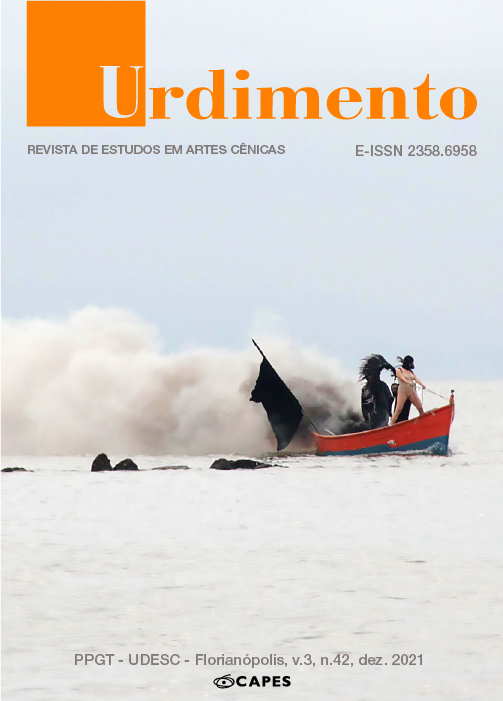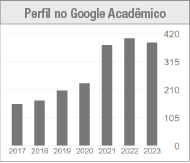Invented traditions and creation of belonging space: A literature review
DOI:
https://doi.org/10.5965/1414573103422021e0201Keywords:
Tradition, Taquaruçu, Giants PuppetsAbstract
The present study aimed to present the initial ideas being developed in a research carried out in the scope of the PhD in Performing Arts at UNB. The research aimed to expose the conceptions of the Festa dos Bonecos Gigantes, which take place in the municipality of Taquaruçu, in Tocantins, to defend the hypothesis that it constitutes an invented tradition, which was designed in order to designate a space of belonging hitherto non-existent for its makers. Here, concepts from different fields of knowledge were discussed to first support the concept of belonging as an ontological institution inherent to human beings in society. Afterwards, the concept of invented traditions was discussed, and finally, the research locus and the affectation of this work were presented: the aforementioned party. It is possible to understand the Aldeia TabokaGrande as a space invented to feel belonging.
Downloads
References
BALLESTRIN, Luciana. América Latina e o giro decolonial. Revista Brasileira de Ciência Política, Brasília, n. 11, p.89-117, maio - agosto de 2013.
BAUMAN, Zygmunt. Modernidade Líquida. Rio de janeiro: Jorge Zahar, 2001.
BEZERRA, N. A. A migração em Palmas/TO: a felicidade no imaginário social. Porto Nacional, TO: UFT, 2013.
BIÃO, Armindo. A vida ainda breve da Etnocenologia: uma nova perspectiva transdisciplinar para as artes do espetáculo. Cátedra de Artes, n. 10, 2011. Faculdad de Artes. Pontifícia Universidad Católica de Chile, 2011. Disponível em: http://catedradeartes.uc.cl/pdf/catedra%2010/la%20aun%20breve%20vida%20de%2 0la%20estnoescenologia.pdf
BIÃO, Armindo. Um léxico para a Etnocenologia: proposta preliminar. In: BIÃO, Armindo. Etnocenologia e a cena baiana: textos reunidos, Salvador: P&A Gráfica e Editora, 2009, p.33-44. Disponível:
http://www.teatro.ufba.br/gipe/arquivos_pdf/ETNOCENOLOGIA1.pdf.
BIÃO, Armindo. Etnocenologia e a cena baiana: textos reunidos. Salvador: P&A Editora, 2009.
CASTRO-GOMEZ, Santiago. La hybris del punto cero: ciencia, raza e ilustración en la Nueva Granada, Bogota: Editorial Pontificia Universidad Javeriana, 2005.
HOBSBAWM, Eric; RANGER, Terence. A invenção das tradições. Rio de Janeiro: Paz e Terra, 1990.
MAIA, Tatiana. Modos de pertencimento, fontes de guerra: nacionalismo e identidade religiosa nos séculos XX e XXI. Revista História: Debates e Tendências, v. 19, n. 4, p.666-680, 23 dez. 2019.
MAFFESOLI, Michel. Pós-modernidade. Comunicação e Sociedade, [S. l.], v. 18, p. 21-25, 2010. Disponível em:
https://revistacomsoc.pt/index.php/revistacomsoc/article/view/1471. Acesso em: 18 dez. 2020.
MAFFESOLI, Michel. O Tempo das Tribos - O declínio do individualismo nas sociedades de massa. Rio de Janeiro: Forense Universitária, 2006.
MOURAO, Ada Raquel Teixeira; CAVALCANTE, Sylvia. O processo de construção do lugar e da identidade dos moradores de uma cidade reinventada. Estudos de Psicologia, Natal, v.11, n.2, p.143-151, 2006.
NUNES, Wertemberg. Vida, Obra e Aldeia TabokaGrande. Autor Adailson Costa dos Santos. Entrevista concedida para realização de pesquisa de doutoramento do pesquisador Adailson Costa dos Santos. Online: Via Google Meet, 2020.
PERTENCER. In: DICIONÁRIO da língua portuguesa. Lisboa: Priberam Informática, 2020. Disponível em: http://www.priberam.pt/dlDLPO. Acesso em: 12 dez. 2020.
RAÍZES do Tocantins. Taquaruçu - Bonecos Gigantes da Aldeia TabokaGrande. 2018. Disponível em: https://www.youtube.com/watch?v=viJKbo2QsTk
SOUZA, Bárbara Oliveira. Aquilombar-se: panorama histórico, identitário e político do Movimento Quilombola Brasileiro. 2008. Dissertação (Mestrado e Antropologia Social) - Universidade de Brasília, Brasília, 2008.
VELOSO, Graça. Bendito, divino, consagrado: velhos mestres e novos foliões. Brasília: Trampolim, 2018.
ZAOUAL, H. Nova economia das iniciativas locais: uma introdução ao pensamento pós-global. Tradução de Michel Thiollent. Rio de Janeiro: DP&A: Consulado Geral da França/COOPE/UFRJ, 2006.
Downloads
Published
How to Cite
Issue
Section
License
Copyright (c) 2021 Urdimento - Revista de Estudos em Artes Cênicas

This work is licensed under a Creative Commons Attribution 4.0 International License.
Copyright Statement
The articles published by the magazine are free to use. The copyright is all assigned to the magazine. The articles whose authors are identified represent the expression from the point of view of their authors and not the official position of the journal Urdimento. The author (s) undertakes whenever publishing material relating to the article published in Revista Urdimento mention the said publication as follows: This article was originally published by Urdimento magazine in its volume (put the volume), number (put the number) in the year of (put the year) and can be accessed at:
http://www.revistas.udesc.br/index.php/urdimento
This work is licensed under a Creative Commons Attribution 4.0 International License.




